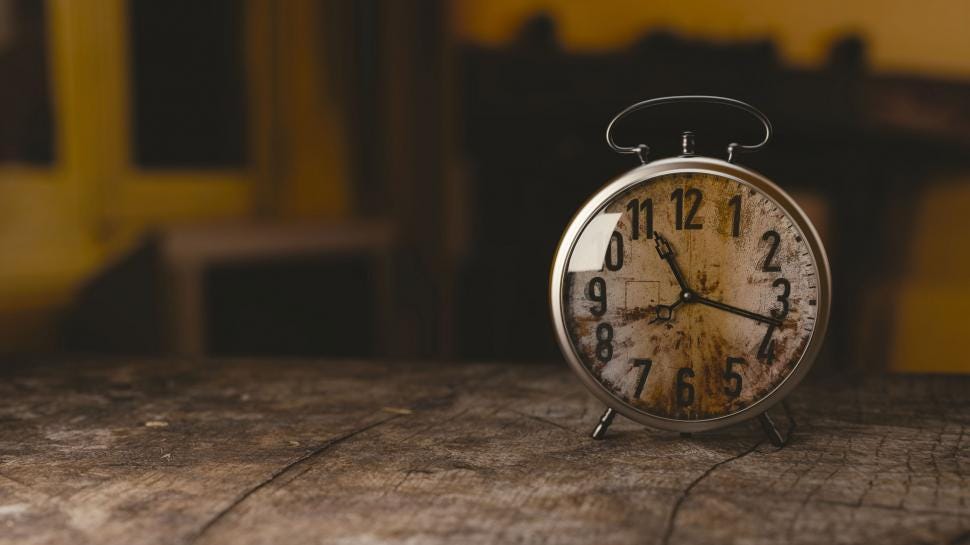I remember once having a conversation with my oldest daughter when she was very little and realizing that, from her simple perspective, everything in the past was “yesterday" and everything in the future was “tomorrow.” I recall smiling and thinking to myself how cute and naive her way of thinking was, but I've since come to realize that her mindset was more healthy and biblical than mine.
If I were to ask you what the most impacting invention of the past 800 years has been, what would you answer? Typical responses include the Internet, the printing press, coffee (though I think that goes back further than 800 years), etc. It’s a fun question to think about, but author Lewis Mumford has the best answer: the clock.
In his book Technics and Civilization, Mumford writes of how the invention of the clock in the fourteenth century made us into time-keepers, then time-savers, and now time-servers. He points out that once the clock came along, eternity ceased to serve as the measure and focus of human events; instead, the timepiece did.
The late NYU professor, Neil Postman, in his book, Entertaining Ourselves to Death, goes on to finish Mumford’s observation:
"We have learned irreverence toward the sun and the seasons, for in a world made up of seconds and minutes, the authority of nature is superseded. The clock introduced a new form of conversation between man and God, in which God appears to have been the loser. Perhaps Moses should have included another commandment: Thou shalt not make mechanical representations of time."
About 12 years ago, I stopped wearing a watch. Though I still had need on a daily basis to know what time it was, I gave up my timepiece for the simple reason that my preoccupation with it was turning me into a time legalist. Everything I did—brushing my teeth in the morning, meeting with someone for lunch, spending time with my kids—took on meaning by how much time I spent doing it.
This silly little habit got to the point where I began breaking up the day not in terms of morning, afternoon, and evening or even by blocks of hours or individual hours themselves, but by minutes and sometimes even seconds. (I could brush my teeth in twenty-two seconds—not good for my teeth, nor for me that I knew that.)
Time—not God—was the fixation of my life. And it showed. Sure, I was never late for appointments, but I wasn’t much fun in them either as they all seemed like unforgiving deadlines to me. Megan and the girls were glad when we got time together, but I was always thinking about the rest of my schedule and sometimes had trouble really enjoying those moments. None of this was healthy, and I finally recognized that I needed to take some steps to stop it.
Now I try to consciously decide to use time as the gift it is, rather than the curse I had made it to be. I try to focus more on three basic facts:
God created, dictates, and will one day take time away; it’s his domain (Genesis 1; Job 14:15; Psalm 75:2; Revelation 10:6)
Time applies to all equally and universally; no one cheats time, though some handle it better than others (Ecclesiastes 3:1; Hebrews 9:27-28)
Time has nothing to do with my significance as a child of God; still, God wants me to be faithful with it as his child (Ephesians 5:15-17; Colossians 4:5)
Here are three myths about time that I have to work to avoid believing:
It is up to me to create, dictate, and hold onto time (impossible anyway)
Others have more time than I do (they don't)
The less time I have/appear to have, the more important I am (busyness does NOT equal value)
The Puritans had a concept of redeeming time rather than spending time. This idea helps us think about how we use our time. We need to learn now to redeem the time we’ve been given instead of just spend it. Spending time is particularly tragic because, unlike money, we can’t reclaim it. In fact, wasting time quite literally means we are wasting our lives—a scary proposition no matter how you think about it!
(Go to part 2.)




